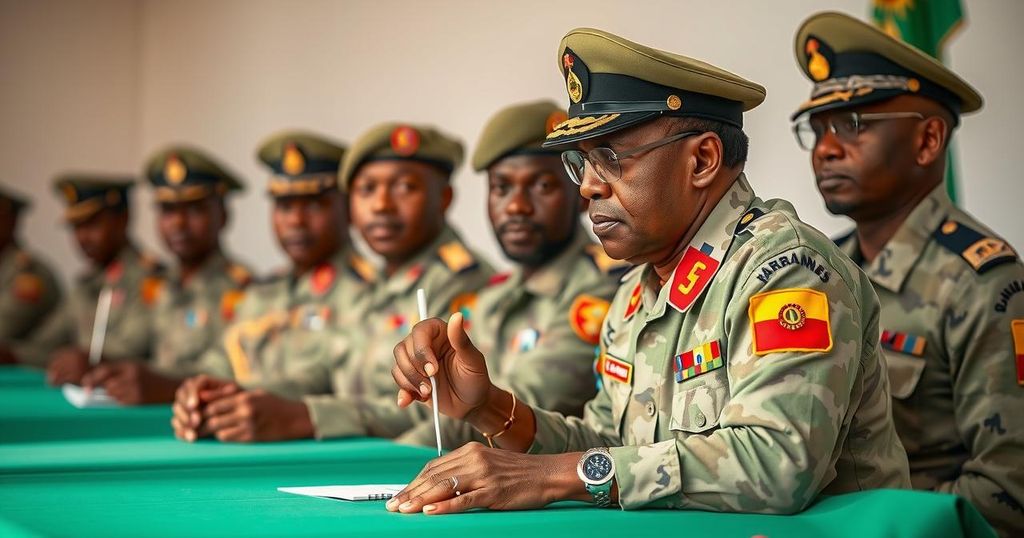Chad Conducts General Election Amidst Boycotts and Low Turnout
Chad held a general election on Sunday, deemed crucial for transitioning away from military rule. Voter turnout was reported at only 38% due to an opposition-led boycott. The situation raises concerns about the election’s legitimacy and reflects the challenges within Chad’s political environment amidst ongoing tension and calls for reform.
On Sunday, Chad held a general election deemed crucial by the government in its efforts to transition away from military rule, which has been in effect for three years. Despite the significance of the vote, participation was expected to be minimal due to a boycott called by opposition parties. Preliminary reports indicated a voter turnout of approximately 38% for elections concerning parliament, provincial assemblies, and local councils, according to the national elections management agency, ANGE.
Election officials in affluent districts attributed the low turnout to “cold weather,” although opposition leaders asserted that Chadians were largely following the boycott. Succes Masra, head of the opposition Transformers party, stated, “the overwhelming majority” of voters abstained as a result of the boycott. This situation may significantly benefit candidates affiliated with President Mahamat Idriss Deby Itno, who initially ascended to power via military means in 2021 and subsequently solidified his position in a controversial presidential election last May, denounced by opponents as fraudulent.
In a show of support for the election process, President Deby urged citizens to engage in voting, posting on social media about the importance of the day. However, opposition party members expressed skepticism, arguing that results had already been predetermined.
Many citizens voiced disillusionment, with individuals like Herve Natouingan stating that participation felt futile, as there seemed to be “no real voting in Chad.” In contrast, Patrice Lumumba Deoumoundou expressed hope for transformational changes impacting employment, justice, and equality. Historically, segments of the military and nomadic communities voted a day earlier for logistical convenience, with the election management agency claiming an exceptional voter turnout in these groups.
Polling sites, under the observation of about 100 foreign monitors and party representatives, have continued amid accusations of electoral fraud, including claims by the opposition regarding the disappearance of ballot papers intended for certain regions. Compounding these electoral challenges, Chad grapples with external threats from Boko Haram and fluctuating relations with former colonial power France while facing dissent regarding its involvement in the Sudanese conflict.
The current elections are framed by the government as the concluding phase of a democratic transition that began following the death of Deby’s father in 2021, after his long-standing dominion.
Ultimately, the low voter turnout and heavy opposition boycott highlight the complex political landscape in Chad, raising questions about the legitimacy of these elections and the future trajectory of democracy in the country.
Chad has experienced a period of military governance following the death of former President Idriss Deby, who ruled for approximately three decades. The election held recently is positioned by the current government as a critical step toward reinstating constitutional governance and establishing a semblance of democracy. Opposition parties have consistently challenged the legitimacy of the military rule, arguing that the political processes are manipulated to favor the ruling party. Amid regional instability, including threats from extremist groups and conflicts in neighboring countries, the stakes of these elections are notably high. The previous electoral processes have been marred by allegations of fraud and corruption, exacerbating public skepticism regarding the electoral system in Chad.
The recent election in Chad has underscored the challenges facing the nation’s democratic aspirations amidst military governance. With a significant boycott led by opposition parties, low voter turnout, and accusations of pre-determined outcomes, the legitimacy of the electoral process comes into question. In light of ongoing political tensions, societal demands for change, and external security threats, the future of Chad’s democratic transition remains uncertain as the nation seeks to navigate this precarious political landscape.
Original Source: www.kpvi.com




Post Comment